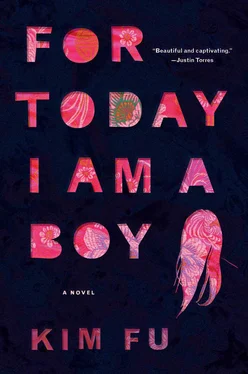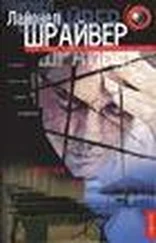Mother tried again. “So! Do you have a girlfriend?”
“Yes.” We both seemed surprised by my response.
“Is she Chinese?”
“No.”
Her gaze fixed on the ponytail tossed over my shoulder. “Your father will be pleased,” she said. All around us, the cart-pushers continued to call out, trailing the sounds and smells of what my mother had lost. This was supposed to mean something to her, the idea of a girlfriend. The conversation between them after Adele and Helen were born, the need to try again for a son — my father must have told her about this day, when I would have a girlfriend, and then I would have a wife, then a son, and we would be a real family, an endless line.
She stared at my ponytail, at another of her strange, disappointing children. She remembered holding newborn Adele, searching her blank heart for the joy she’d been promised. She imagined me offering her a male grandchild, a baby clothed in her married name, another greedy mouth. She didn’t care. Mother, a pilgrim who walked a thousand miles only to find the sacred grove was just a clump of trees.
Bonnie called from someone else’s phone, someone who was doing something in the background that made her giggle and gasp. She said, “I finally caught you. You’re never home. Want to have breakfast with me tomorrow?” I told her that I had to work. “The next day?” I had work then too. “What, do you work seven days a week?” Yes. “Days and nights?”
“Mondays I only work days. Tuesdays I only work nights.”
“Jesus. Why do you do that to yourself?”
“I need the money.”
“For what?”
My rent was paid after only a few days of work. I ate most of my meals at the restaurants. I had no debt. I had endless energy, even — or especially — once I started seeing Margie. I kept thinking that this was only the prelude, that my body was a starter home. I would need money when I decided to start my real life. “The future,” I said.
A man’s distant voice. Bonnie let out a satisfied groan, like a splinter had been pulled out of her thumb. “Whatever,” she said, returning to our conversation. “Then let’s have breakfast on Tuesday, when you only work nights.”
When I didn’t reply right away, she added, “I miss you.” She yelped. “Stop that!” she called, her mouth farther from the receiver, her hand perhaps covering it. “You still there?”
The diner advertised its $1.99 breakfast special in paint on the window, orange letters with green outlines and a sharp-edged explosion around it. Wow! it said. The flat-roofed building also housed a tire store and an entrance to the Métro station. A bell over the door rang as I walked in.
Bonnie sat at a four-top with Margie and her son, Dave. Between them, cups of oily coffee and a crusty ketchup bottle and a saltshaker with a dead bug inside; the only other customer ate alone at the counter. A saxophone version of “The Girl from Ipanema” played at low volume. The free chair scraped loudly across the floor as I pulled it out and sat down next to Dave.
“Hi, Peter,” Bonnie said. “I thought it’d be fun if we all had breakfast together. Hope you don’t mind.” She wore a child’s sweatshirt with the neckline cut out so that the sweatshirt slid over her narrow shoulders. Her eyes blazed, tense in their sockets.
I nodded. I tried to catch Margie’s eye. She stared stonily into the distance. I had never seen her in full daylight, without makeup. The colors of her skin and eyes and hair were dulled, and her expensive clothes — a cream-colored satin blouse with a bow tied at the neck, more tailored slacks — seemed sad and out of place. I wanted her to sit in my lap and let me reach under her clothes, to feel the body I coveted, envied, knew better than my own.
“We were just talking about Dave’s birthday party last year. Margie took him and a bunch of friends on a cruise. For Dave’s twenty-fifth birthday.” Older than you, Bonnie meant, her voice cheery.
“It was awesome,” Dave said.
“What did you do for your birthday, Bonnie? I’m sorry I missed it. When you were in California. With Helen.” Helen who judged you, I meant, as you’re judging me.
“Nothing special,” Bonnie hedged, keeping the conversation on her track. She put her hand on Dave’s arm. “Tell Peter about Akhil.”
“Oh, yeah. This is hilarious. Margie fucked a maintenance guy on the cruise and got him fired. It was, like, in the boiler room or something. Whatever that’s called on a ship. And they got caught by — what are they called? One of the sailor dudes? The important ones? Sorry, I’m not very good at telling stories. But it was fucking hilarious.”
Bonnie gave a fake, sparkling laugh. Excited, like it was all a game, she squeezed Dave’s arm again. “Tell him about the rainbow.”
“Oh, yeah. We used to joke that Margie was aiming for a rainbow. ’Cause she always fucked a guy of a new color, yeah? Like Akhil was the Indian band of the rainbow. Bonus points if they don’t speak English.”
Bonnie kept flicking her eyes sideways to Margie — who cradled her coffee cup vacantly, as though there were nothing strange in a son talking about his mother this way, in front of his mother’s new lover — and then back to me. I’m sure Bonnie’s imagined scenes were dead-on. The humiliation, the racial stereotypes so old or specific I had never encountered them before. Bonnie thought she was saving me. But Margie had saved me. This was the only way I could do it. This was the closest I could get.
“How far into the rainbow are you?” Bonnie asked Margie. Dave laughed earnestly, like he couldn’t feel the shift in the air.
“Just a joke,” Margie said, her words slow and stiff.
“Peter must be slowing you down.” Pretending to choke on her mirth, pretending it was that funny! “You’ve been stuck on yellow for so long.”
Margie looked at me. I could tell she was startled by my expression. I was trying to tell her that I loved her, that I worshipped her, that nothing Bonnie said could change that. Margie leaned away from me, away from my radiant love, like I was a slobbering, mangy dog with shit-mottled hair ready to jump up on her clean slacks. “Just a joke,” she repeated.
I went to Margie’s house after work, as always. She usually led me straight to her bedroom or its connecting bath, and I never thought about the rest of her house. That night, we walked through her dark front hall to the living room. She turned on a couple of gloomy, shaded lamps. “Drink?”
“No, thanks.”
We sat on the couch. Old-fashioned, stuffed green leather, with button studs in the back. It squeaked. I smelled like fish. I wanted Margie to make me pretty in the bath, for her to stand in front of me in the mirror, wanted to squint my head onto her body.
Margie kissed me. We kissed longer than we ever had. I opened my eyes. I could see her scowling, her eyes shut aggressively tight as she mashed her mouth against mine. She shoved me backward. “Do something!”
“What?”
She leaped up from the couch and went to the window. Thick, diamond-patterned glass, the same as in the sideboard that ran along the wall. She pushed aside a heavy curtain. Her house was at the top of two flights of concrete steps, strip lawns on either side. Chemin de la Côte-Sainte-Catherine, a busy but uninteresting street, ran below. The only things she would be able to see were car lights heading up the mountain, their white heads and red tails, and the tops of trees. She watched the traffic for so long that it made me nervous.
“What do you want me to do, Margie? Tell me. I’ll do anything.”
It was hard to see her where she stood, some distance from the lamps. A flash rain had just started, one that would last for only an hour. “I’m getting bored with you.”
Читать дальше












